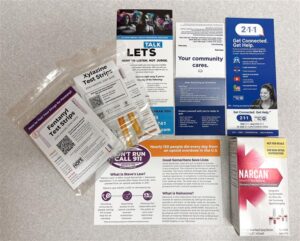March is Colon Cancer Awareness Month, an important time to educate people about the risks of colon cancer and how to prevent it. Colon cancer is one of the most common cancers and is the second leading cause of cancer deaths in the world. According to the American Cancer Society, it is estimated that one in 23 men and one in 26 women will develop colon cancer.
What is colon cancer?
Colon cancer is a type of cancer that affects the large intestine or rectum. Typically, it begins as a polyp, a tiny growth on the lining of the colon. If left untreated, these polyps have the potential to develop into malignant cells over time and spread to other body regions.
What are the signs of colon cancer?
The symptoms of colon cancer may include a change in bowel movements, blood in your stool, bloating, abdominal pain, changes in bowel habits, and losing weight for no reason. Early on there may not be signs, which is why screenings are so important.
Who is at risk of colon cancer?
While colon cancer can affect anyone, certain factors increase a person’s risk of developing the disease. These factors include:
- Age: The risk of colon cancer increases with age, and most cases are diagnosed in people over 50 years old.
- Family history: Individuals who have a history of colon cancer or colorectal polyps in their family are more likely to get the illness.
- Lifestyle factors: Processed-food diets, sedentary lifestyles, smoking, and binge drinking all raise the risk of colon cancer.
How can colon cancer be prevented?
Colon cancer can be prevented or detected early through regular screenings. The most common screening tests for colon cancer are colonoscopies and stool tests.
The gold standard for colon cancer screenings is a colonoscopy. Colonoscopies involve a doctor examining the colon and rectum using a flexible tube with a camera on the end. Both Grand Itasca and Fairview Range offer colonoscopies.
“For every 1,000 colonoscopies, 28 lives are saved,” shares Dr. Patty Carlin-Janssen, a Family Medicine physician at Grand Itasca. “Compare that to mammograms, which take 3,000 to save one life. Early colon cancer screenings are so valuable to your health.”
Stool tests are also a great, less invasive option. They involve analyzing a stool sample for signs of colon cancer. This can be done at home in most cases. Products like Cologuard can be ordered by your provider and shipped to your home. You don’t need to change your meds or take anything to make the process work.
In addition to regular screenings, lifestyle changes can also reduce the risk of colon cancer. A healthy diet, high in fiber, fruits, and vegetables, and low in processed foods, meats such as sausage and bacon, and charcoal smoked meats is beneficial. Regular exercise, maintaining a healthy weight, and quitting smoking can also reduce the risk of colon cancer.
Who should be screened?
“The current recommendation is anybody with a low risk should start getting screened at age 45,” explains Dr. Carlin-Janssen. “But if you have risk factors such as a family history of colon cancer, or a history of chromes or colitis, or have had polyps previously, you should be screened at a younger age.”
What can you do to support Colon Cancer Awareness Month?
Colon Cancer Awareness Month is an opportunity to raise awareness about colon cancer and encourage people to get screened for the disease.
“It’s important to raise awareness because certain cases of colon cancer can be treated. Catching it early makes a difference in your survival rate,” explains Dr. Carlin-Janssen.
“If you have a colonoscopy and they find a polyp, your survival rate over five years is 100%. If they find stage one cancer cells, you’ll have a 93% survival over the next five years. If they find stage four cells, the survival rate over the next five years is only eight percent. Screenings matter very much.”
You can support Colon Cancer Awareness Month by:
- Getting screened for colon cancer if you are over 45 years old or have a family history of the disease. Get started by asking your provider about colon cancer and your risk level.
- Sharing information about colon cancer and the importance of screenings with your family, friends, and community.
- Participating in and donating to local events and fundraisers that support colon cancer research and awareness.
If you get screened and have normal colonoscopy results, you won’t need another one for 10 years. Cologuard, on the other hand, should be done every three years following a negative test result.
Colon Cancer Awareness Month is an important reminder of the importance of prevention and early detection. By taking steps to reduce your risk and scheduling screenings, you can help save lives and make a difference in the fight against colon cancer.
Reach out to your provider to learn more about your colon cancer risks and to schedule or order a screening.



